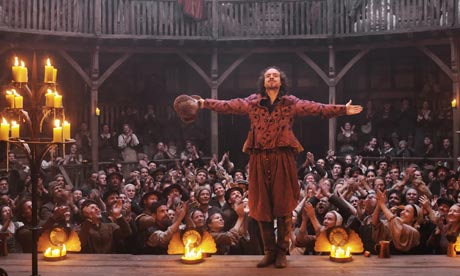Looney's conspiracy theory revived by new film "Anonymous".
Given the power of popular culture to communicate narratives, one is always nervous when 'biographical films' emerge in this age of 'infotainment'. Readers of this blog and my TOK blog, will be aware of my posts concerning our fascination with conspiracy theories and my caution that critical thinking be applied to any and all of these conspiracies.The idea that a secret has been unlocked can be quite appealing even when the 'evidence' does not stand up to scrutiny.
I have resisted posting on this film but a surprising number of students and colleagues have watched it and a few were seemingly seduced by its slick production values and generally good acting.
So I have watched it and was at times entertained by the acting but disappointed by liberties taken with known facts accepted by the overwhelming majority of academics and scholars.
Although the plot will prove confusing to those not already familiar with real life characters transposed into this grotesque fantasy. Was it necessary to portray Shakespeare as a semi-literate fraud? Was it necessary to have the usually wonderful Derek Jacobi sneer at the 'son of a glove maker'?
William Shakespeare's plays were written by William Shakespeare, a well-documented historical figure who lived between 1564 and 1616.
In 1920, a schoolmaster with the apt name of John Thomas Looney invented a conspiracy theory suggesting that Shakespeare's plays were written by Edward de Vere, 17th Earl of Oxford.
One of troubling sub-texts of the recent film is that only a nobleman could have possessed the genius to be the 'real' author of the works of Shakespeare. This is snobbery dressed up as revelation.

Given the power of popular culture to communicate narratives, one is always nervous when 'biographical films' emerge in this age of 'infotainment'. Readers of this blog and my TOK blog, will be aware of my posts concerning our fascination with conspiracy theories and my caution that critical thinking be applied to any and all of these conspiracies.The idea that a secret has been unlocked can be quite appealing even when the 'evidence' does not stand up to scrutiny.
I have resisted posting on this film but a surprising number of students and colleagues have watched it and a few were seemingly seduced by its slick production values and generally good acting.
So I have watched it and was at times entertained by the acting but disappointed by liberties taken with known facts accepted by the overwhelming majority of academics and scholars.
Although the plot will prove confusing to those not already familiar with real life characters transposed into this grotesque fantasy. Was it necessary to portray Shakespeare as a semi-literate fraud? Was it necessary to have the usually wonderful Derek Jacobi sneer at the 'son of a glove maker'?
William Shakespeare's plays were written by William Shakespeare, a well-documented historical figure who lived between 1564 and 1616.
In 1920, a schoolmaster with the apt name of John Thomas Looney invented a conspiracy theory suggesting that Shakespeare's plays were written by Edward de Vere, 17th Earl of Oxford.
One of troubling sub-texts of the recent film is that only a nobleman could have possessed the genius to be the 'real' author of the works of Shakespeare. This is snobbery dressed up as revelation.
"Anonymous" tragedy or farce?
The
outrageous liberties taken with history in this film about who really
wrote Shakespeare's plays would be easier to swallow if it were witty
and intelligent – forsooth it is not.
READ THE FULL ARTICLE ON THE GUARDIAN WEBSITE HERE.

